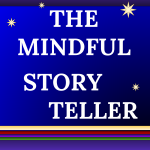
“The house of the [Scottish] story-teller is already full, and it is difficult to get inside and away from the cold wind and soft sleet without…There are many present – men and women, boys and girls. All the women are seated, and most of the men. Girls are crouched between the knees of fathers or brothers or friends, while boys are perched wherever – boy-like – they can climb…The [storyteller’s] tale is full of incident, action, and pathos. It is told simply yet graphically, and at times dramatically – compelling undivided attention…” – Alexander Carmichael, Carmina Gadelica, p. xxviii-xxix(Introduction) (1900)
∞∞∞∞∞∞∞∞
We may be jealous of those cultures and times when storytellers seemed to abound. What would it be like to have a storyteller arrive at your door, walk in, sit by the fireplace, and entertain your family for the evening?
Of course, we are inundated with stories. We have the weight of stories on the news, through social media and television. Then, there are the stories deemed as “entertainment,” endless films and TV shows – some of these even hold the same mythic elements as we might have found in that Scottish storyteller’s tales – magical creatures, heroic action, dazzling beauty, characters with noble aims or sinister intent, choices, fumblings, adventures, resolutions, further problems.
With all these stories and all this storytelling, why might one still hold envy for that old-fashioned storyteller knocking on the door – asking for a bit of food and lodging while offering to bring a few old tales to life?
Do not be too hasty to give answer to the question. Let’s just sit with it…and perhaps add a few additional queries: What would it be – to have this person enter your living space and transform it with their words, gestures, and expressions? What does it mean – the physicality of this being who holds story and from whom stories pour? The teller might be able and strong or feeble, bent, and weak – but how is it that they could occupy space in your home – and, simultaneously, begin to fill space in your mind and heart? And what is your reaction to this storyteller in your home – are you entranced by the tales or are you worried that he may be a “thief in the night”? Or worse? How are others in your home reacting? Are children and loved ones bored? Smiling in anticipation of the teller’s next word or gesture? Relaxing into a wakeful half-sleep as the teller’s story rolls on?
We humans are incredible creators: automobiles, rocket ships, cures for diseases, microchips, bridges, works of art, stories. We don’t know what we are capable of making. The impossible and unimaginable often becomes the imagined and the real.
Is it possible, even today, to create a community where a storyteller might knock on your door and offer a tale in exchange for a bit of food or lodging. It is impossible, of course, right?
∞∞∞∞∞∞∞∞
We are creating this world, our communities, our meanings.
Imagine this: Someone learns to tell a couple of stories – maybe folktales, maybe original stories – and/or perhaps a song or two. They then call five friends (maybe some of these friends have young children) and say, “Imagine if some night next month, without warning or a call ahead, I just show up on your doorstep ready to tell a tale or sing a song? Will you let me in…and share your dinner with me, too?” One of the five (maybe more) says, “Sure,” and, once again, the solid world of impossibility crumbles under the light weight of the magician’s feet.
(Music: Courtesy of Adrian Von Ziegler, “Sacred Earth.” )